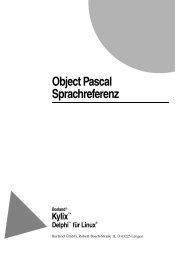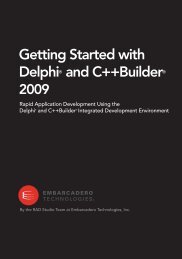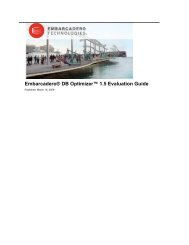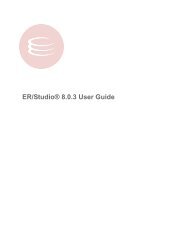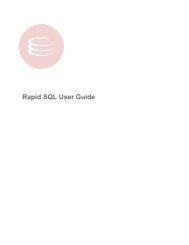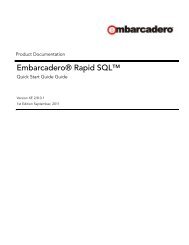RAD Studio for Microsoft .NET - Embarcadero Technologies
RAD Studio for Microsoft .NET - Embarcadero Technologies
RAD Studio for Microsoft .NET - Embarcadero Technologies
You also want an ePaper? Increase the reach of your titles
YUMPU automatically turns print PDFs into web optimized ePapers that Google loves.
1.1 Developing Database Applications with <strong>RAD</strong> <strong>Studio</strong> <strong>for</strong> <strong>Microsoft</strong> .<strong>NET</strong> AdoDbx Client Overview<br />
Deploying Database Applications <strong>for</strong> the .<strong>NET</strong> Framework ( see page 24) When deploying database applications using <strong>RAD</strong> <strong>Studio</strong>, copy the necessary<br />
runtime assemblies and driver DLLs <strong>for</strong> deployment to a specified location. The<br />
following sections list the name of the assemblies and DLLs and the location of<br />
where each should reside.<br />
Note: We strongly encourage you to use ADO.<strong>NET</strong> and the AdoDbx Client<br />
Provider <strong>for</strong> .<strong>NET</strong> database applications. The Borland Data Provider is being<br />
deprecated.<br />
Data Providers <strong>for</strong> <strong>Microsoft</strong> .<strong>NET</strong> ( see page 27) In addition to supporting the providers included in the .<strong>NET</strong> Framework, <strong>RAD</strong><br />
<strong>Studio</strong> includes AdoDbxClient Providers <strong>for</strong> <strong>Microsoft</strong> .<strong>NET</strong>.AdoDbx Client is an<br />
implementation of the .<strong>NET</strong> Provider and connects to a number of popular<br />
databases.<br />
This topic includes:<br />
• Data Provider Architecture<br />
• AdoDbx Client Advantages<br />
• AdoDbx Client and ADO.<strong>NET</strong> Components<br />
• Supported AdoDbx Client Providers<br />
• AdoDbx Client Data Types<br />
• AdoDbx Client Interfaces<br />
Stored Procedure Overview ( see page 29) All relational databases have certain features in common that allow applications<br />
to store and manipulate data. A stored procedure is a self-contained program<br />
written in a language specific to the database system. A stored procedure<br />
typically handles frequently repeated database-related tasks, and is especially<br />
useful <strong>for</strong> operations that act on large numbers of records or that use aggregate<br />
or mathematical functions. Stored procedures are typically stored on the<br />
database server.<br />
Calling a stored procedure is similar to invoking a SQL command, and <strong>RAD</strong><br />
<strong>Studio</strong> provides support <strong>for</strong> using stored procedures in much the same ways as it<br />
supports editing and... more ( see page 29)<br />
dbExpress Framework ( see page 30) The dbExpress framework (DBX framework) is a set of abstract classes provided<br />
in the unit DBXCommon. Applications can interface with the framework in several<br />
ways: using the framework directly <strong>for</strong> both native and managed applications,<br />
and using the dbExpress VCL components that are layered on top of the<br />
framework <strong>for</strong> both native and managed applications.<br />
Although many applications interface with dbExpress drivers via the dbExpress<br />
VCL components, the DBX framework offers a convenient, lighter weight option<br />
to communicate with a database driver. You can also create a database driver <strong>for</strong><br />
dbExpress by extending the frameworks's DBXCommon abstract base classes.<br />
The... more ( see page 30)<br />
dbExpress Framework Compatibility ( see page 31) Some dbExpress software developed prior to the dbExpress driver framework<br />
(DBX driver framework) has been modified to work with the DBX driver<br />
framework. As a result of these changes, some compatibility issues arise.<br />
Getting Started with InterBase Express ( see page 32) InterBase Express (IBX) is a set of data access components that provide a<br />
means of accessing data from InterBase databases. The InterBase<br />
Administration Components, which require InterBase 6, are described after the<br />
InterBase data access components.<br />
1.1.1 AdoDbx Client Overview<br />
The AdoDbx Client implements an ADO.<strong>NET</strong> 2.0 provider <strong>for</strong> all dbExpress version 4 drivers that implement the newer extended<br />
metadata added to dbExpress 4. All dbExpress drivers shipped with Delphi implement the newer extended metadata.<br />
AdoDbx Client is an implementation of the ADO.<strong>NET</strong> 2.0 Provider classes. ADO.<strong>NET</strong> Provider is a set of classes that provide<br />
database services <strong>for</strong> .<strong>NET</strong>. It provides access to relational databases, XML and application data. You can use it to develop front<br />
end database applications as well as multi-tier business applications.<br />
See .<strong>NET</strong> Framework Developer's Guide ADO.<strong>NET</strong> in the <strong>Microsoft</strong> documentation <strong>for</strong> more in<strong>for</strong>mation.<br />
Here are the key classes in the AdoDbx Client ADO.<strong>NET</strong> implementation.<br />
• TAdoDbxCommand. Represents a SQL statement or stored procedure to execute against a data source.<br />
5<br />
1



